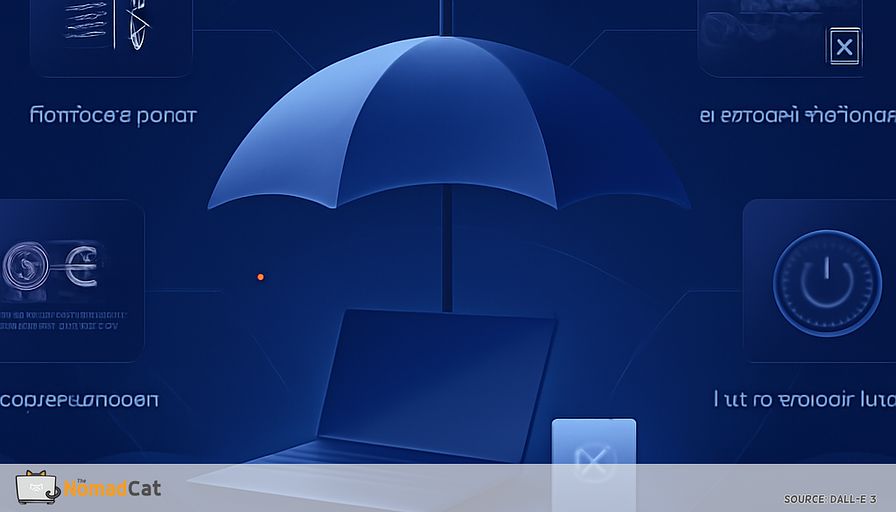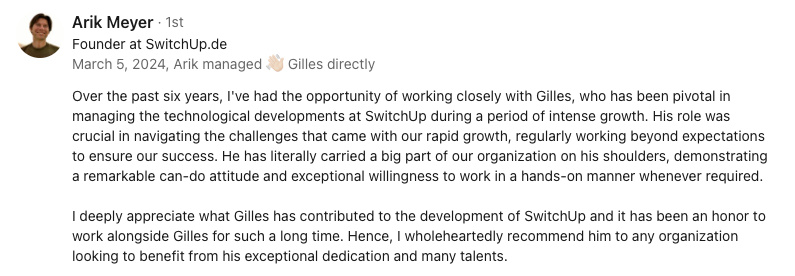Abstract:
The article explores how tech freelancers in Europe often rely on routines—such as quarterly spreadsheets, automated payments, and annual reviews over coffee—to manage taxes and retirement, but warns that these static habits can create a false sense of security in the face of unexpected events like tax rule changes, sudden income shifts, or cross-border moves. Instead, it advocates for scenario planning as a minimalist yet resilient approach, encouraging freelancers to regularly test 'what if' situations—such as income changes, relocations, new regulations, and life events—using simple tools like tailored spreadsheets and automated checklists. Real-world anecdotes illustrate the risks of relying solely on routine, such as a developer caught off guard by tax complications when moving from Berlin to Lisbon, a Dutch freelancer surprised by new tax liabilities after a big contract, and a UK tech lead who maintained pension contributions during a family break through proactive scenario checks. The article emphasizes embedding scenario prompts into existing workflows with automated reminders and leveraging community support and expert advice to stay updated on changing rules. Ultimately, it argues that true financial peace of mind for freelancers comes not from elaborate systems, but from the habit of regularly anticipating and preparing for change, making resilience part of a minimalist, stress-free routine.
Routine can be a freelancer’s best friend—until it isn’t. When I first started freelancing in Berlin, quarterly tax prep felt like a ritual: spreadsheets, automatic transfers, and a yearly review over coffee. I even set up a private pension (Rürup-Rente), thinking I had everything under control. But life has a way of surprising you. A sudden tax rule change or losing a major client can turn a solid plan upside down, and the usual checklists just aren't enough.
This article shares a fresh way to think about financial planning for tech freelancers, especially those juggling quarterly tax preparation and country-specific retirement products. I’ll show how scenario planning—testing out 'what if' situations—can build real resilience. You’ll get practical tips for handling income changes, cross-border moves, new rules, or unexpected life moments. I’ll also share the minimalist tools I use to keep things stress-free, real stories from my own freelance journey, and ideas for making these habits fit smoothly into daily life without adding more stress.
You’ll see how a few simple tricks—like quick scenario checks or smart reminders—can help you move from just feeling in control to actually being ready for surprises. No need for complex systems or elaborate spreadsheets. Just a bit of curiosity and some good habits can make a big difference. It makes sense, no?
Why scenario planning matters
Routine risks for taxes and retirement
Freelancers around Europe rely on routines for taxes and retirement: checklists, reviews, automations. I used to think my quarterly spreadsheets and automated pension transfers were enough. But these habits can give false confidence. When Germany changed its tax reporting rules, I nearly missed a deduction window and faced a penalty. The bigger risk? Many freelancers use generic checklists not tailored for the unpredictable nature of tech work. Studies show that relying on passive systems can backfire, especially when freelancing brings big ups and downs.
Unlike salaried workers, freelancers deal with much bigger swings in their finances. I’ve had years where my income dropped 30% after losing a client, and others where a big contract pushed me into a new tax bracket. Getting back on track takes time. Missing a pension contribution window in Germany, for example, can mean losing access to certain tax incentives for the year. Europe adds another layer: tax rules and cross-border payments change often, so if you don’t plan ahead, surprises get more expensive.
Sticking to one routine is especially risky in Europe, where a move to another country can flip your obligations overnight. Even if you have everything automated, moving or an unexpected health event can mess things up. I learned the hard way that without scenario planning, even the most prepared freelancers can get caught off guard. So, what’s the solution? The trick is shifting from static routines to scenario-based planning that can bend with changes instead of breaking.
Minimalism needs resilience
Freelancers often cut back their financial tools and automate tasks to keep life simple. But real peace of mind doesn’t come from doing less—it comes from systems that can handle surprises. Resilience doesn’t mean making things more complicated. It just takes simple strategies that can stretch when needed. Scenario planning makes this possible. It lets freelancers get ready for curveballs without overloading their schedules.
When I started running through a few what if scenarios—like moving towns in the middle of the year or losing a major client—I felt less stressed and stayed calm during disruptions. It’s a bit like keeping an umbrella in your bag: you might not need it, but you’ll be glad it’s handy in the rain. Minimalism is about focusing on what matters. Scenario planning sharpens that focus.
Being minimalist isn’t about stripping everything away. It’s about creating habits that protect both your time and your future. Prioritizing regular reviews instead of lots of tools can reduce anxiety and help you guard what matters. It makes sense to look at the key situations every tech freelancer should be ready for.
Five scenarios every tech freelancer should model
Income changes and ripple effects
Freelance income is never guaranteed. One month, a big client leaves and income drops by 20% or more. The next, a big contract lands and your income jumps into a new tax bracket. I remember skipping a pension payment during a lean month, then struggling to pay extra taxes when business picked up. It really threw off my plans.
Windfalls have risks too. Common problems include:
- Underestimating tax payments, leading to debt
- Forgetting to make pension contributions during slow months
- Not adjusting payments after getting a big contract
- Missing rules about social security limits and incentives that change with income
Sudden jumps in income can trigger higher taxes, change social security calculations, or take away some tax discounts. When I set up a Rürup-Rente in Germany, I learned how income swings could affect my contributions. Modeling both the highs and lows helps avoid overpriced tax bills and missed savings. But income isn’t the only thing freelancers need to watch—where you live matters, too.
Moving countries and the tax residency puzzle
Relocating is common for tech freelancers, but every move to a new country brings different tax, pension, and residency rules. When I moved from Berlin to Lisbon in 2023, I had to navigate Portugal's NHR program and nearly missed the registration window. The details matter, and missing them can cause double taxation or gaps in pension payments.
Things to watch out for include:
- Registering with new tax and social security offices
- Sorting out A1 certificates for overseas work
- Moving or merging pension savings
- Checking if you can join special tax systems
Tiny administrative steps make a huge difference. Scenario planning helps map out your move: tracking how many days you’re in each place, looking at the rules, and deciding how taxes and pensions will change.
A simple checklist before a move can uncover risks and opportunities. For example, knowing when your residency status changes can show you exactly where to pay taxes or contribute to pensions. Rules change too, often without warning.
Adapting to new rules and compliance surprises
Tax and pension rules change often in Europe. Just in the last few years, there’ve been new rules for platform work, pension reforms, and changes for cross-border workers. Using last year’s checklist doesn’t work if deductions or rules have changed.
I once missed a new contribution limit in Germany because I was relying on an old checklist. The result? I lost out on a tax break for that year. Scenario planning means you keep track of upcoming changes and check them before they matter. Reviewing and testing your plan keeps things smooth, even when new rules pop up. And sometimes, life itself changes everything.
Life events and currency swings
Illness or family emergencies can pull you away from work, cutting income and pausing pension contributions. Some countries offer help, like sick pay or parental leave—others don’t, so you might need your own savings. For those working with clients in other countries, currency shifts can add to the challenges.
I remember the anxiety when the euro suddenly strengthened against the yuan while I was living in Beijing—it made my tax bill jump overnight. If you get paid in pounds or francs but pay taxes in euros, a sudden change in the exchange rate can mess up your numbers.
Modeling these surprises can help you save enough and choose the right insurance. Maybe set aside more savings, check your insurance, or decide the best time to add to your pension. Being proactive helps build a buffer so surprises don’t hurt quite as much.
Steps for scenario modeling:
- Spot the main risks: drops or jumps in income, moves, rule changes, big life events, and currency changes
- List out the steps to handle each one (like paperwork, contributions)
- Use simple tools (spreadsheets, reminders) to check your plan regularly
- Ask for professional advice on complex moves or big life changes
With these scenarios in mind, freelancers can go from patching up problems after the fact to planning ahead and smoothing out the rough spots.
Minimalist toolkit for scenario testing
Simple models for real scenarios
You don’t need fancy apps to model freelance finances. I started with a spreadsheet and a Notion page. First, I listed out income, days spent in each country, pension rates, and big expenses. Keeping it short makes reviewing easier. Digital tools can help—especially when you include reminders or ready-made templates.
Tools like OpenFisca or tax calculators from your own country (Germany’s Elster, France’s URSSAF, or the UK’s HMRC) can help get the numbers right, but they often need tweaks for freelancers. Templates from Notion or Google Sheets are out there, but it’s important to tailor them to your own details. In Germany, missing a quarterly pension contribution can mean losing access to certain tax incentives for the year.
For each scenario, a small change—like lowering income by 30% or moving to a different country—shows how taxes and retirement savings move around. The point isn’t to have everything perfect, just to see what could shift. Even rough estimates help keep you aware of changes.
Templates and checklists keep it simple
A basic scenario review doesn’t have to take long. Once a year—or when big things change—I ask myself:
- Did my income change a lot?
- Did I move countries?
- Are there new tax or social security rules?
- Did I skip any pension contributions?
These questions usually catch trouble before it grows. Using templates from Notion, Trello, or Google Sheets and making them your own makes reviews smoother. Customizing templates with your country’s quirks makes them more practical. Consistency matters more than perfection—a quick review repeated often catches more than a fancy tool that never gets used.
A five-minute check-in that happens regularly is better than a flawless plan you never look at. Simple checklists help you keep things on track with little fuss. Now, what happens when plans meet reality?
When plans are put to the test
Moving countries on short notice
Every step of an international move can affect taxes and retirement. When I relocated from Berlin to Lisbon, I was surprised by how quickly I had to update my A1 certificate and register for Portugal's social security. I nearly missed the NHR registration window, which would have meant losing out on a major tax benefit. Checking in with an expert and running through a scenario plan helped me avoid serious financial gaps and stress. When old routines get disrupted, quick adaptation is key.
These moves usually require:
- Updating A1 social security certificates
- Reviewing bilateral tax agreements to avoid double taxation
- Transferring or merging pension savings
- Fast registration with local officials
Skipping any step can leave you without coverage or with extra bills. Big changes in income also bring surprises.
Income spikes and pension surprises
Good news isn’t always simple. After landing a huge contract in the Netherlands, my income doubled. The happy moment did not last: taxes went up, pension and social limits were hit, and new rules applied almost overnight. Scenario planning helped me avoid missing out on voluntary pension additions or forgetting to adjust deductions. Winning a big deal can sometimes mean you lose access to tax perks unless you plan for these changes.
Income jumps can also cut freelancers off from certain tax benefits, especially in countries with income thresholds. Testing 'what if I get this contract?' lets you adjust pension or contribution choices so you’re not stuck with a shock come tax time. Not every curveball is a bad one.
Work interruptions and family events
Some of the biggest shifts come from positive changes. When I took a six-month break for family in the UK, scenario planning helped me keep my pension on track and check out eligibility for state support. Without that, I might have ended up with a hole in my retirement savings that could last for years.
Life changes—not just negative surprises—carry the most risk. A quick ‘what if’ review turns a big shift into something manageable. Making these reviews a regular habit can take some of the pain out of change.
Automating resilience with reminders
Setting up reminders
Automation makes scenario planning simpler. Tools like Trello, Asana, or just a Google Calendar event can send annual or quarterly nudges to review your scenarios. These prompts help you remember to keep pulse on your finances, even when life gets busy. The best plans are the ones you remember when it matters.
You can take automation further. Zapier or IFTTT let reminders link to life events—for example, picking up a new client or changing addresses can trigger a checklist to review your setup. This way, reviews happen when things change, not just on a random calendar date.
Prefer a simple system? Even a repeated Slack or Todoist reminder works. The key is to get reminders where you already hang out, not hidden in a distant app. No need to complicate things—a gentle nudge in your regular workflow is usually enough.
Scenario checks blend right into normal to-dos, so they’re barely noticeable but still effective.
Embedding checks into workflows
Scenario prompts fit easily into business checklists. Whether bringing on a new client, preparing taxes, or planning a move, it’s good to add a quick line: 'Does this affect tax or retirement?' This can stop issues before they start:
- New client: Any new rules?
- Quarterly review: Any big income jumps or drops?
- Moving: Does this affect where retirement payments go?
- Life event: Does anything need changing?
Community templates on Notion or Trello often provide finance or compliance checklists—customizing these to add scenario reminders makes resilience a built-in habit, not a chore. When something becomes second nature, it keeps surprises from ruining your plans, and it doesn’t feel like more admin.
Sticking with easy, repeatable steps will keep everything on track, even when things get busy or weird. Being perfect isn’t the goal—staying ahead of trouble, even a little bit, is plenty.
Experts and peers often advise turning these reviews into regular routines. If you set up automated checks, you can handle changes smoothly and without panic.
Insights from experts and the freelance community
Avoiding pitfalls during transitions
Errors during big life changes are common: forgetting to review tax agreements, not updating pension details, or missing rules for partial years in a new country. These slip-ups can be expensive or leave gaps in retirement credits. Even a small error, like not updating a certificate or moving pension money, can turn into a major headache.
Most pros suggest checking with an advisor before big changes, especially with cross-border moves. Building a scenario model helps spot which country’s rules matter and what to fix before it’s too late. Even reviewing a checklist with a professional can catch the holes and keep your plan on track.
A simple, shared checklist often solves lots of problems before they cost you. Community groups also help—many freelancers report that asking questions and sharing stories has helped them sidestep trouble.
Where to find support and updates
It’s tough to stay updated on rules by yourself. Online communities like Freelancer’s Union Europe, Malt Community, and LinkedIn groups offer tips and alerts when regulations change. These are often the quickest way to learn about new problems and find workable solutions.
Official resources matter, too. The EU’s 'Your Europe' portal, company tax guides, and local associations give accurate info. Checking at least one solid source before a big move or contract can help you avoid missing important detail that could impact your tax or retirement.
Mixing advice from communities, professionals, and digital tools helps freelancers stay flexible. This balance makes staying prepared easier, combining peer speed, official detail, and simple templates into one toolkit. With the right approach, it becomes much more manageable to stay resilient—even when things shift quickly.
For me, the biggest lesson has been that a simple checklist—reviewed regularly—beats any complex system. It keeps me ready for whatever comes next, whether it's a new client or a new country. Minimalism isn’t just having less; it’s being ready for anything, without complicating life. Reflecting on what works, and learning from others, keeps everyone prepared. What scenarios do you think matter most to plan for?














